Source: Donga
Did you know that Korea has the lowest birth rate in the world?
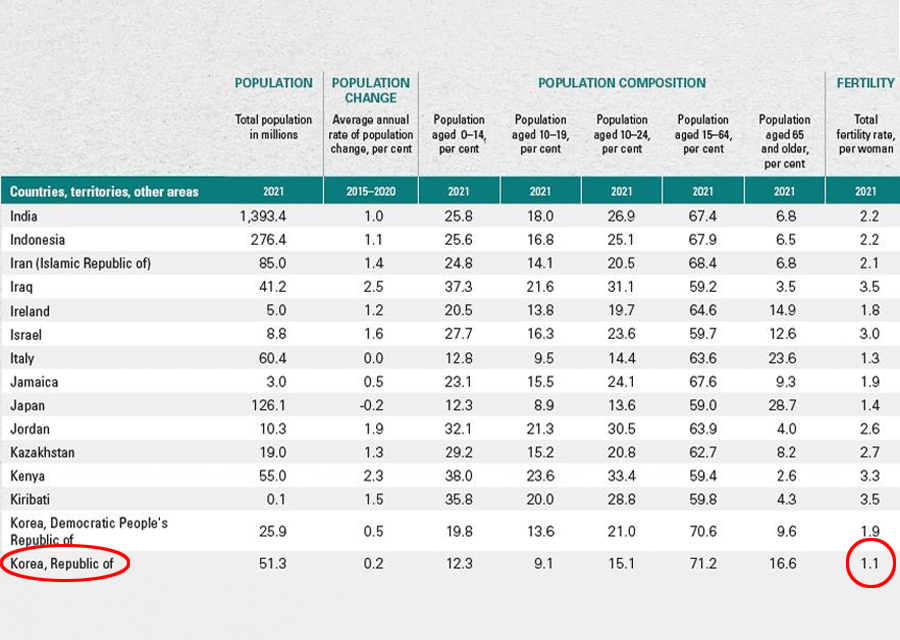
The table above is from the United Nations Population Fund's (UNFPA) World Population Dashboard for 2021.
The figures on the far right of the table represent the total fertility rate.
The total fertility rate and the number of children a woman of childbearing age (15 to 49 years old) is expected to have in their lifetime is shown.
As you can see from the table, Korea's total fertility rate was 1.1, ranking 198th out of 198 countries around the world.

The graph above shows Korea's total number of births and fertility rate trends according to data released by Statistics Korea in February 2021.
From the left, it shows the trends of 2015, 2018, and 2020.
To make it easier to view, please refer to the organized graph below.
| Number of births | Total fertility rate | |
| 2015 | 438,400 | 1.24 |
| 2018 | 326,800 | 0.98 |
| 2020 | 272,400 | 0.84 |
As you can see from the table above, you can see that the number of births and the total fertility rate in Korea declined at a rapid speed over the recent years.
The total fertility rate in Korea in 2020, as estimated by Statistics Korea is 0.84, which is extremely low.
Today, we will dive into the reasons behind this low fertility rate in Korea.
Let's go through the analysis together.
First of all, we must acknowledge a fact that we can't ignore. It's that the fertility rate of married women has continued to increase.
According to one statistic, as of 2016, the total fertility rate for married women was 2.23.
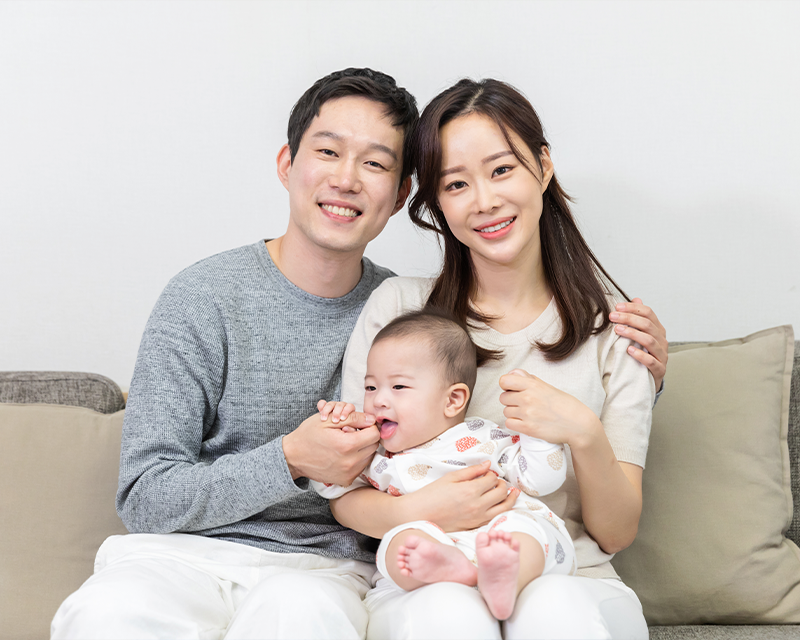
Despite the increased fertility rate of married women being over 2.0, the fact that the overall fertility rate is not even 1.0 means that many women choose not to marry at all.
In fact, according to the data released by Statistics Korea, the number of marriages in 2020 has reached an all-time low.
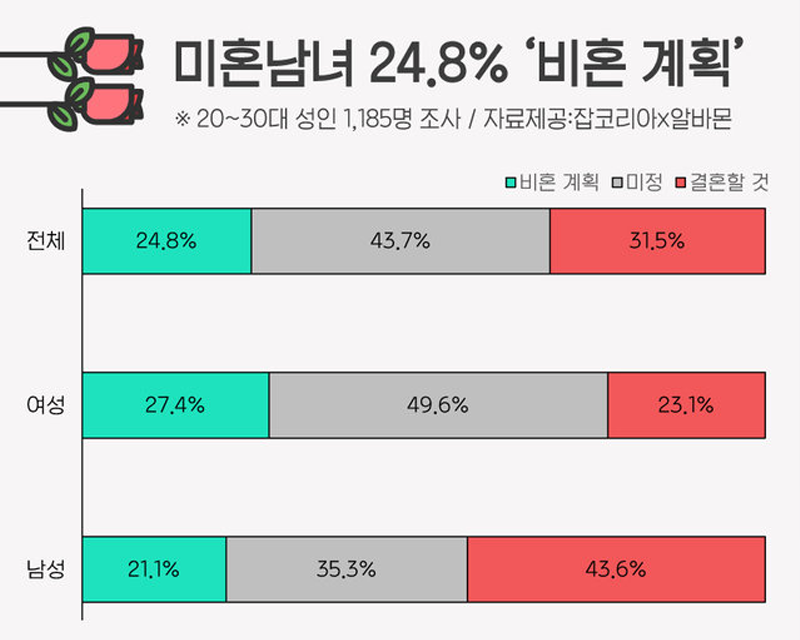 Source: JobKorea X Albamon
Source: JobKorea X Albamon
Also, according to the results of a survey conducted by JobKorea and Albamon, the perception of marriage in Korea among people in their 20s and 30s has changed a lot from the past.
In the graph above, the green represents people that are planning to get married, and the red represents those that aren't planning on ever getting married.
The gray area represents those that are undecided.
The graph represents both women and men, and you can see that 24.8% of people in their 20s and 30s aren't planning on getting married.
This means that one in four people in Korea is choosing not to marry, which is an incredibly high number.
Especially for a country that has emphasized the importance of getting married and starting a family, such as Korea.
So why does the younger generation in Korea decide against getting married and having children?
Let's find out what factors contribute to the low birth rates.
Financial Reasons

1. Housing Prices
The first factor to look at is the ridiculous prices of housing in Korea that exceed beyond imagination.
In order to start a family, you need a home. But that has been a challenge for many.
Many young people are unable to become financially independent from their parents because of the prices of housing.
It seems that getting married and purchasing a home for their family is so far from their reality.

In 2020, the median yearly income of a four-person household in Seoul was about 57 million won.
With the average housing prices ranging at 900 million won, people can only afford to buy a home if they do nothing but breathe for 16 years.
Realistically, it is extremely difficult for a newlywed couple to have a decent home in Seoul.
There are real estate benefits and loans set up for newlyweds, but even if you buy a home with a loan, you will have to spend many years trying to pay off the debt.
2. Child Support

Raising children anywhere in the world costs a lot of money.
However, it appears that the costs of raising a child is a lot higher in Korea due to the high demand for quality education.
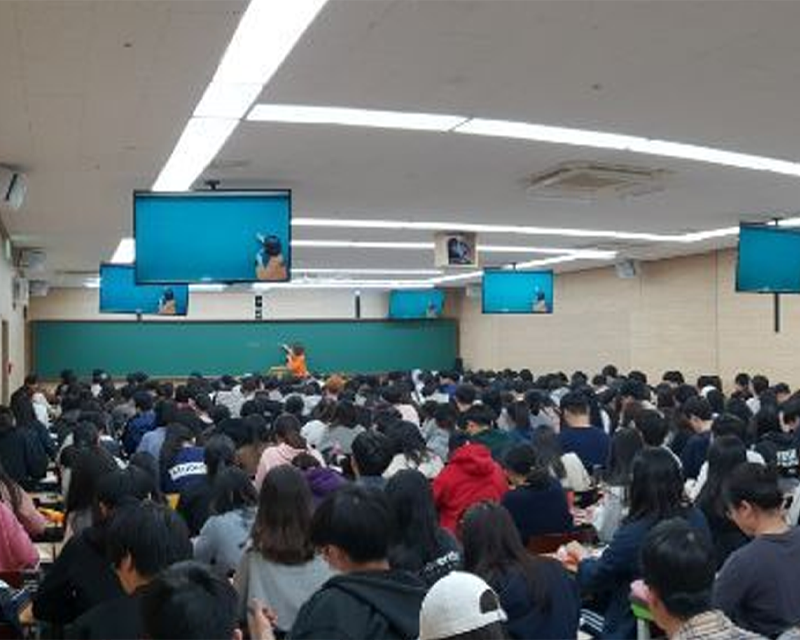
Korean students attend several private education academies with the sole purpose of getting into a good university from a young age.
And the financial support obviously comes from the parents.
In fact, as of 2019, the rate of students attending these academies was 74.8% in Korea, and a survey result showed that the average cost of education was 429,000 won per month.
In this situation, the cost of raising a child will inevitably be high. According to statistics, it takes about 300 million won to raise one child until they become an adult.

But the generation of today don't have enough economic freedom to cover all of this.
30% of university graduates in Korea work as non-regular workers and are experiencing high unemployment.
If you get married without taking into account these factors and have children, you may end up at a place where you can't afford to support your children.
Change Of Perception

Korea traditionally had a very family-oriented culture.
It was the norm to get married at a certain age, give birth and raise children.
Everyone's goals were the same, to live happily-ever-after with their own families.

However, in recent years, more and more people do not want to sacrifice their personal lives to put their families first.
In other words, there is an increased amount of people that see marriage as simply an option rather than a necessity.
As I introduced earlier, the number of people who do not want to get married has increased significantly.
 Source: tvN
Source: tvN
In particular, women's rights and education levels have risen, and many women choose not to marry.
They are more focused on their careers and becoming independent rather than devoting themselves to their children or families as the generation before did.
In fact, many of the women I met in college do not even think of marriage in the future.

Most say that they might consider it in the future if they meet the right person, but at this point, they're more focused on building their own careers!
Marriage rates have declined considerably as getting married and starting a family began to be perceived as a high risk to one's career and personal life.
Societal Challenges
As mentioned above, the change of perception has occurred rapidly, but in many cases, the institutional and societal changes have not yet been able to keep up.
Maternity / Parental Leave

Of course, maternity and parental leaves in Korea are well established.
However, according to a 2018 survey, 35.8% of working women with children took parental leaves rather than maternity leaves.
In other words, although maternity leaves are set up for them, there are often organizational pressures that stop them from using them freely.

Also, there are many women whose careers take a pause due to pregnancy and childbirth.
As of 2000, it's illegal to fire a woman due to those reasons but there are many cases where it's still secretly penalized and they are pressed to leave their jobs.
According to a survey, 2 out of 10 people failed to return back to their companies after taking maternity leaves and 3 people were fired from their jobs.

In addition, taking parental leaves for men is even more difficult.
Because of the perception that it's still a woman's job to take care of the children, men often want to take their parental leaves to support their families but the company makes it a challenge.
Even outside of the company, there are many looks given to a man negatively if they are stay-at-home dads.
Many people sadly view it as him raising a child because he is incapacitated for work.
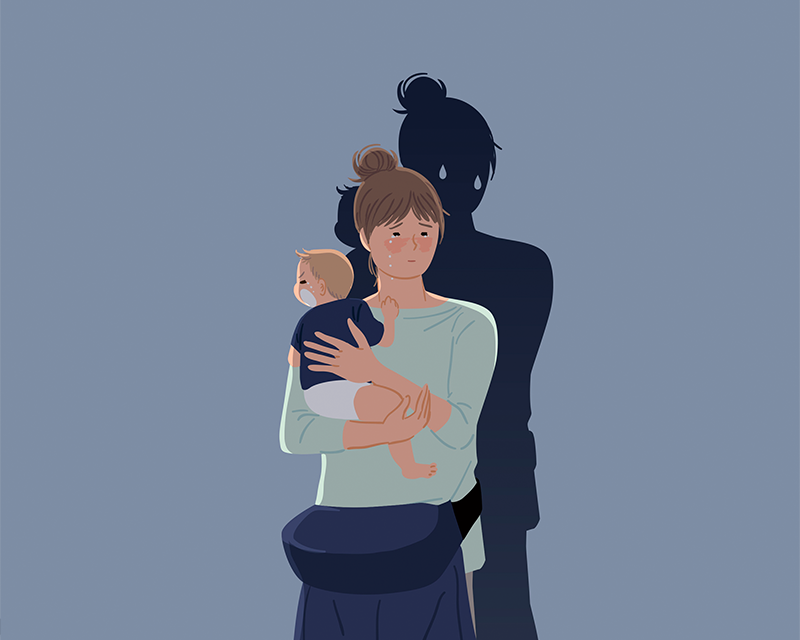
As such, the organizational environments that pressure women to have children, then don't offer the right support is one of the biggest reasons for the low birth rate.
Long Working Hours

According to OCED labor statistics, Korea is known as of the countries with the longest working hours in the world.
According to 2017 data, the average work hours per year in Korea is 2,024 hours, compared to 1,746 hours per year in 36 countries.
This means that people in Korea work for 1.7 months longer than the OECD average.

Individuals simply don't have the time to have their own personal lives outside of work, and getting married gets burdensome.
In the case of married people who don't have children, they have concerns about having children as they would not have enough time to invest in them.
A 52-hour workweek and flexible work systems are in place and slowly changing, but the change is unlikely to happen overnight.
Cultural Reasons
 In Korea, there is a term called "Hell Joseon" (헬조선), it's a combination of the English word "hell" (헬) and Korea's last dynasty, "Joseon" (조선).
In Korea, there is a term called "Hell Joseon" (헬조선), it's a combination of the English word "hell" (헬) and Korea's last dynasty, "Joseon" (조선).
It's a devastating term used to describe the hopeless state of the culture in Korea that's closer to hell.

With challenging factors such as excessive competition, high inflation, unemployment rates, and wealth inequality, the younger generation of today have the belief that it's extremely difficult to live in Korea.
In fact, Korea has the number one suicide rate among OECD countries.
This is more than twice the OECD average, with about 38 people taking their own lives per day.

So many people say that they do not want to pass on the pain they suffer to their own children and that they don't want to be born in such a difficult world.
There are many people who believe that their future is hopeless and dark enough that they do not picture themselves having children.

The low birth date issue in Korea is a result of very complex societal and cultural reasons.
Some point out that the low birth rate is a serious problem for the aging population, while others say that it's a way to solve problems caused by the excessive population.

Both opinions are valid but most important of all, we need to create an environment where we can live happily with or without children.
Institutional, societal, and cultural cultures need to change so that both individuals and those with families can chase after their own happiness.
What are your thoughts on this topic? Let us know down in the comments below.




